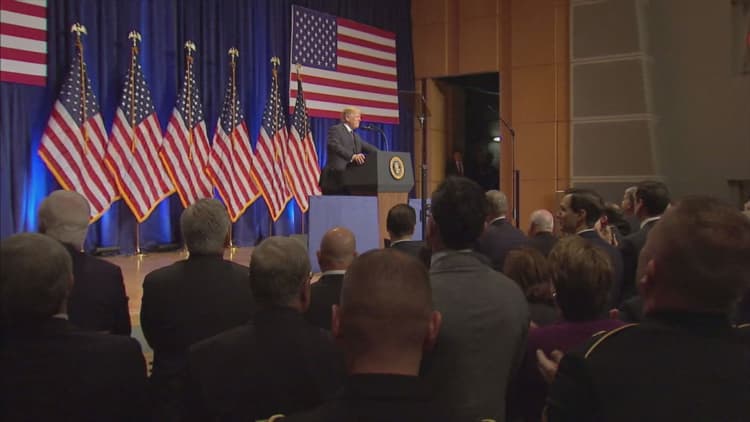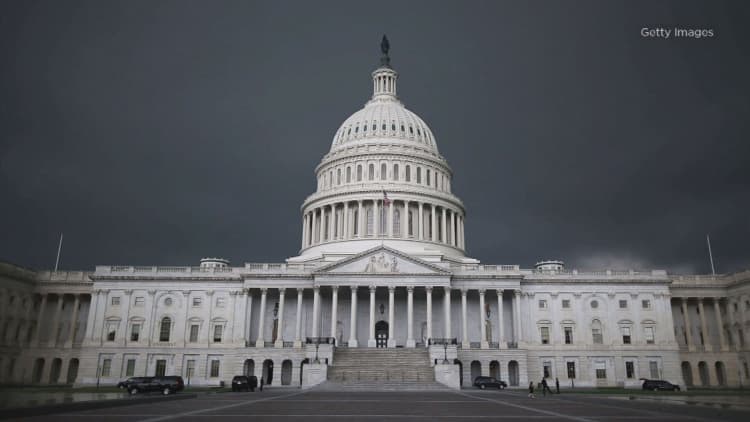Candidate Donald Trump made a bold prediction on the night he declared himself presumptive Republican nominee for president. "We're going to have a great relationship with Putin and Russia," Trump said at the April 2016 rally.
But nearly a year into the presidency, it's not clear that the U.S.-Russia relationship has gotten any better, despite the president's hopes and some critics' fears. This state of affairs was recently underlined by Trump's own secretary of state.
"The United States today has a poor relationship with a resurgent Russia," Rex Tillerson wrote in an op-ed in The New York Times on Wednesday.
Trump and his foreign policy head into 2018 weighed down by a criminal investigation into his campaign's ties to Russia, an entrenched and recalcitrant foreign policy establishment and little government experience to rely on. All of these issues threaten to steer his presidency off course and hamper his political ambitions ahead of the 2020 presidential campaign.
The stark difference between reality and Trump's rhetoric suggests the president lacks a coherent foreign policy, international relations experts have said. As a result, Trump's intentions have been overridden by career government officials who do not share his desire for better relations with Moscow.

"The president is not at the wheel of the U.S.-Russian relationship," said Mark Simakovsky, a nonresident senior fellow at the Atlantic Council's Dinu Patriciu Eurasia Center. Simakovsky formerly served as the chief of staff for Europe and NATO issues in the office of the undersecretary of defense for policy.
The president has publicly claimed that a good relationship with Russian President Vladimir Putin would be an "asset" to American diplomacy, and he has championed the relationship's potential in the fight against the Islamic State. But the actions taken by his administration have inflamed the Kremlin.
The hostility between the two countries has only escalated in recent weeks, experts said, bolstered by a , new on Russian nationals, and the authorization of as it fends off its eastern neighbor.
"The combo of [Magnitsky Act] names, arms to Ukraine, and the NSS language most certainly will impact the way Russian elites think about Trump and his administration," Michael McFaul, who was U.S. ambassador to Russia under President Barack Obama, told CNBC.
The Russian foreign ministry has expressed disdain for the president's moves.
"All of this looks ridiculous in the context of the common threats and challenges that our two countries and the world in general are facing," ministry spokeswoman Maria Zakharova said in a briefing this month, decrying the new sanctions imposed under the Magnitsky Act.
The Magnitsky Act, a 2012 sanctions law the Kremlin opposes, played a role in Trump's presidential campaign. Russian lawyer Natalia Veselnitskaya has claimed that the president's eldest son, Donald Trump Jr., told her during an initially undisclosed June 2016 meeting at Trump Tower that Trump's White House would be willing to review the law. Trump Jr. has said the purpose of the meeting was to discuss damaging information on Democratic presidential candidate Hillary Clinton.
While the president's moves have driven a wedge between the White House and Russian elites, it's not clear that the divide has carried through to Russians as a whole.
"There is an underlying emotional 'current' there in Russia that the two leaders would and should get along and eventually solve all the problems," said Eric Shiraev, a professor at George Mason University who has written several books on international relations, political psychology and Russia.
On a Dec. 19 episode of Russia's "60 Minutes," Alexander Losev, a foreign policy scholar, discussed Trump's first national security strategy with the married hosts, Olga Skabeeva and Evgeny Popov. The national security strategy departed sharply from the president's former comments on Russia, experts have said. The administration's policy document calls Russia a "revisionist power" antithetical to U.S. interests.
"Trump has nothing to do with this," Losev said, referring to the document. "It was all written two years ago." Popov interrupted to explain that he thought Trump is on Russia's side.
The contradictions between Trump's public pronouncements and United States policy have only accelerated over time. The relationship, meanwhile, has continued to worsen.
"I think the Russians are clearly confused," said the Atlantic Council's Simakovsky.
The Trump administration's unfocused foreign policy is the result of "amateurs" at the head of the executive branch and State Department, said Dan Caldwell, a distinguished professor of political science at Pepperdine University.
"We have some competent people," he said, naming Defense Secretary James Mattis and national security advisor H.R. McMaster. "But they can't implement foreign policy on their own."
The White House did not respond to a request for comment. A representative for the State Department told CNBC that the United States seeks to normalize its relationship with Russia. Ultimately, the representative said, the choice is Russia's to make.
While the White House attempts to improve ties with Russia, special counsel Robert Mueller's investigation into alleged Russian meddling in the 2016 campaign continues, bringing increased scrutiny to any policy decision regarding the nation.
That investigation has already ensnared former national security advisor Michael Flynn, who pleaded guilty Dec. 1 to lying to the FBI regarding his communications with then-Russian Ambassador Sergey Kislyak about U.S. sanctions on Russia.
In July, Congress overwhelmingly passed new sanctions bills that constrained the president's ability to maneuver on Russia — which were widely interpreted as a rebuke to the president's autonomy on foreign policy. At the time, Putin called the sanctions "illegal under international law."
Despite the frayed relations, Putin and Trump seem to remain united on an integral point. "Both Trump and Putin want to put [Mueller's investigation] in the rearview mirror," Pepperdine's Caldwell said.
"If President Trump was removed from office, then things could be even worse than they currently are," he said.
WATCH: Where Mueller's Russia probe stands heading into 2018



